- Home
- Jean Stone
A Vineyard Crossing Page 8
A Vineyard Crossing Read online
Page 8
Both men declined the offers to for help, saying thanks, but they could manage their gear.
“Bill, you’ll be upstairs in the Inn,” Annie said. “Simon, we’re giving you the cottage, down toward the beach. I hope it works for you.” She could have said it was the best they could do on such preposterously late notice and during the second-busiest week of the season. But she knew that an important part of being an innkeeper was to stay both friendly and positive, and if they received a poor TripAdvisor review, Kevin would be all over her case. That is, if he still cared.
“I’d like to see the Inn first,” Simon said. “Get the lay of the land, you know?” Leaving his bags on the patio, he gestured for Annie and the others to go inside, and he followed.
For Simon, the highlight of the tour wasn’t the media room, as Annie might have expected, but the reading room. “Very nice,” he said, while his gaze skimmed the volumes that lined the shelves. “Eclectic.” Apparently it didn’t bother him that her tenants the elementary schoolteachers were sitting in the comfy chairs, pretending—yes, pretending, Annie thought, as she hadn’t seen the pair in there before—to be reading. He said hello to them both; they twittered nervous replies.
For Bill, the best part seemed to be the great room with its wall of windows that, according to him, offered “a photographer’s fantasyland.” Indeed, as the sun struggled to burn through the leftover murky air, in the distance, the Edgartown lighthouse was bathed in a pale golden aura.
Simon suggested they get organized in their rooms; he told Bill he’d text him when he was ready to hunt for lunch. He said good-bye to the honeymooners, who had tagged along for the tour; to Greg and Harlin, who were huddled in the media room playing some sort of game—also no doubt pretending because, again, Annie noted this was the first time she’d seen them in there—and to Toni and Ginny, who were still in the kitchen, scrubbing and disinfecting the stainless appliances and smiling the whole time. Annie wondered if Simon thought the ladies were members of the staff.
“Sorry about asking for a tour,” Simon said to Annie as they went outside and he picked up his bags. “I’ve found that whenever I land somewhere new, it helps if I get the gawking out of the way. But I suppose you know what I mean.”
Annie hardly considered that being recognized in bookstores or at the post office could be compared with what Simon had to deal with. Few best-selling authors would be picked out in a generic crowd—Stephen King, J. K. Rowling, Neil Gaiman, perhaps more. But Annie was fairly certain that countless more people turned on the news at night than picked up, or ever would pick up, one of Annie’s mysteries and study her image on the back cover.
“This way to the cottage,” she said with what she hoped was only the slightest hint of a smirk, then led the way down the sloping hill.
* * *
He used the word “quaint,” when Annie opened the door. She’d been hoping for “homey” or “comfortable”; “quaint” reminded her of the peony wallpaper that had decorated her grandmother’s dining room. He shoved his bags into the corner of the living room, plunking the duffel on the edge of her equally quaint braided rug. The one that her peony-wallpaper-loving grandmother had made.
Annie told him to help himself to anything he wanted in the kitchen; she then showed him the bedroom, the bathroom, and the writer’s room.
“You live here?” Simon asked.
She laughed. “Don’t worry. You’ll have the place to yourself. We’re a little tight this time of year, so we make do however we can.”
“Please tell me you won’t be sleeping on the beach. Remember the opening scene in Jaws that took place at night and that young couple . . .”
“Yes,” Annie said she remembered. “Are you planning to make a film? Is that why you’re here?” She hadn’t intended to ask outright, but, well, there it was. There had to be a good reason that he’d left New York and come out to the island and brought an assistant who’d noted that the view was a “photographer’s dream” and therefore might have cameras and equipment inside the duffels.
Simon smiled his several-million-dollar smile but didn’t answer.
“I didn’t tell our guests that you were coming,” she added, returning the smile. “But it’s a small island. Apparently, the word had spread before I’d hardly known. But though my audience is miniscule compared with yours, I understand your need for privacy. Most islanders do. Celebrities are everywhere here.” She hoped she hadn’t offended him, but she didn’t want him to think that she engaged in gossip. “But please,” she added, “let me know if any of them bother you.”
“Don’t worry. I can handle it. Besides, my reason for being here isn’t terribly sensational. I’m laying the groundwork for a special report on how climate change is affecting our country’s top vacation spots. I’d give you the details, but I wouldn’t want one of my competitors to scoop me on it.” He winked. She melted a little. Just a little.
Then, as she pulled her thoughts back to reality, Annie realized that the topic of climate change in top vacation spots didn’t sound like one of Simon’s cutting-edge, never-been-done documentaries; perhaps he had a shocking new angle to the story. Of course there would be more to it, she thought. No journalist won as many Emmys as he had by exposing too much about a project—to anyone—prior to the airdate. “We have a guest who’s also interested in the influences of climate,” Annie said. “She’s actually doing a study of the leatherback turtles. Their patterns are changing due to warmer waters.”
“Is it one of the ladies in your library?”
“No. You didn’t see her.” It occurred to Annie that, once again, Mary Beth had been absent. She hadn’t seemed like a loner and yet . . .
“Perhaps you and I can have dinner one evening,” Simon was saying. “I can tell you more about my concept and we can talk about how I might be able to tie-in a promotion for your Inn. It’s the least I can do after kicking you out of your home.”
Unsure if he were asking for a date, trying to drum up advertising sponsors, or simply tossing off a casual remark, Annie didn’t know if she should tell him that she was going to be married soon. But that would be presumptuous, so she only said, “Perhaps we can.” She smiled again and left him to settle in. Slipping off her rain jacket, she walked back to the Inn to tell everyone they were now free to get on with their day. After which there was one more thing she needed to do.
Chapter 9
Sitting in the reading room that Toni and Ginny had deserted, Annie penned an old-fashioned, ink-on-paper note that she hoped sounded pleasant:
Hi Mary Beth,
If you haven’t heard the news, I wanted to alert you that Simon Anderson of CBN fame is with us for the next ten days. He’s in my cottage; his assistant, a fellow named Bill, is in Francine’s room while she’s elsewhere on Chappy. I’ll be on the property 24/7, camping out upstairs in the outbuilding by the meadow. Don’t hesitate to pop over if you need anything.
Simon is here to work on a documentary about climate change. I told him you have a special interest in that in relation to the leatherbacks, so if he asks you about it, you’ll know why. Maybe he can help you get good exposure for your study and a job at the lab!
She signed it, tucked it in an envelope, then went upstairs and slipped it under Mary Beth’s door. Annie loved that the Inn provided a chance to bring people together; maybe Simon’s extroverted personality would help bring Mary Beth out of her shell. Then she smiled at her choice of the word “shell” when thinking of Mary Beth, the turtle lady.
Her next task was to call Lottie at the community center and ask her to please extend her thanks to Joe, but that Annie had decided to decline his generous offer to work at the fire station. She said she had to stay at the Inn in case anyone needed her. After hanging up, she went to the workshop, where she parked her belongings and the sleeping bag she’d borrowed from Earl. Grabbing her laptop and her latest notebook, she retraced her steps, went into the kitchen, and taped a note saying she’d be in the r
eading room if anyone had questions. She put a copy of the note at the front desk. After all, Simon had said the room was “perfect,” and he was right. The restful space filled with books would be an ideal place for Annie to write. Even about murder.
She wondered why she hadn’t thought about it sooner.
Sitting at the square table, she turned on the brass lamp with the green glass shade—a replica of the hundreds of lamps positioned on the tables in Bates Hall at the Boston Public Library. Once having read that the green glass had been presumed to be “easier on the eyes,” Annie had selected the lamp with its twin light bulbs for a different, more important reason: She remembered the weeks and months she’d spent reading and writing in that room as she’d studied the skills she’d later use—plot, character, conflict, and the rest.
She couldn’t believe it had taken Simon’s comment for her to see that she could gather inspiration in the reading room. Especially now that “the gawking” over him was out of the way, having left behind nothing but blessed silence. The way libraries once had been.
The first memory Annie had of the BPL as it was known, she must have been seven or eight. She’d gone downtown with her dad for some reason she did not remember.
“I know you love books,” Bob Sutton had said, “and I know you love stories. So as a special treat I’m going to introduce you to a place that I expect, as you grow older, you’ll return to often. And no matter where you live or where you go in life, it’s a place you won’t forget.”
He took her to the library.
And she fell in love.
In addition to the endless shelves of volumes and the magnificence of Bates Hall, where countless hushed people were hunched over research volumes, scrawling line after line in spiral-bound notebooks, Annie remembered the dioramas—the intricate, three-dimensional miniature scenes that a woman named Louise Stimson had crafted out of cardboard, paper, and other materials. People, houses, workshops, streetlamps, carriages, and more were positioned in in tiny tableaux inspired by books: Alice in Wonderland, The London of Charles Dickens, Printmakers at Work. Scattered throughout the building, each diorama held a story; each was mesmerizing to her.
Her dad had been right; the library was a place Annie never forgot.
And now, by the light of her own green glass shaded lamp, she opened her laptop and got to work on the blog posts for Tricia. She began by writing about that first BPL visit.
She didn’t know how long she’d been working—two hours? Three?—when she became aware of low voices and laughter drifting in from the great room. Checking her watch, she was startled to see that it was after six o’clock. Still, she kept at it, until she sensed that someone else had entered the room. Annie looked up and saw Mary Beth.
“Annie?” she asked. “Can we talk?”
* * *
“It’s about Simon Anderson.” Mary Beth sat across from her. The soft light from the lamp reflected worry in her eyes.
“What is it? Has something happened?”
“I read your note.”
At first Annie thought she was referring to the notes she’d left in the kitchen and at the front desk that mentioned where she’d be. But that would hardly upset her. Then she remembered the one she’d slipped under the door of Mary Beth’s room.
“The one about Simon?”
She looked away. “I don’t want a TV reporter knowing what I’m doing.”
Simon would be irked if he’d heard someone call him a “TV reporter.” After all, his career had arguably grown into something much more than that.
“Oh, Mary Beth,” Annie said, “I’m sorry. If I’d known your research was confidential, I wouldn’t have said a word.” There was no point in saying that Simon had hardly been interested in hearing about her work, that he’d been more intent on asking Annie out for dinner. Yes, she decided right then, he had, indeed, been trying to coax her to go on a date.
Mary Beth stood up. “It’s no trouble. But I also wanted you to know I saw him in Edgartown this afternoon. At the library. It didn’t look as if he was engrossed in reading up on climate change. Unless you wrote about it in one of your books.”
A wave of apprehension rippled over Annie. “What?”
“At first I didn’t realize it was him. I only was aware that someone was sitting in an overstuffed chair by the window, close to the bookshelves. But when I started to squeeze past him, the book jacket caught my eye: Renaissance Heist. Then I saw your name. It’s as big as the title.”
Annie had once been told that the more book sales an author had, the bigger his or her name would appear on the front cover. Trish denied it, saying that “Annie Sutton” fit nicely, which was why they’d bumped up the type size.
“Well,” she said, “that’s my latest. Not counting the one coming out next month.” What on earth had Simon been doing? He’d already admitted he hadn’t read any of her books. Did he intend to try and impress her now? For God’s sake, they’d just met; he barely knew her. She stifled a shiver.
Then she stood up, too. “Was he alone?”
“I think so. I didn’t see anyone else near him. When I got back here and read your note, I thought it was a strange coincidence. But more important, I’d rather not be introduced to him. I’d be afraid he might want to learn more about what I’m doing. I’d hate to have the laboratory find out I’m such an amateur before I’ve applied for a job.”
“No problem, Mary Beth. And again. I’m so sorry I mentioned it to him.”
She averted her eyes back to the bookcase. “It’s okay. You didn’t know.” Then she left as quickly as she’d appeared.
Annie sat back down at the table and stared at her laptop screen. All she could think about was Simon sitting in the library reading one of her books. Why? It almost felt like he was stalking her. She laughed. “Don’t flatter yourself,” she muttered. In person, he was definitely a year or two younger than she was; maybe he was John’s age. But unlike John, Simon was far more worldly to want to be bothered with the likes of Annie Sutton. Still, there was something unsettling about him reading up one of her books in public. If he was so interested, why hadn’t he asked her for one?
If only Murphy would add her two cents.
Mulling over the situation, Annie knew she had no control over Simon’s behavior. But she could at least correct the faux pas she’d made about Mary Beth. So, after looking up his email address at CBN, Annie composed a note:
HI SIMON,
I WANTED TO LET YOU KNOW I WAS MISTAKEN ABOUT ONE OF OUR GUESTS BEING INTERESTED IN CLIMATE CHANGE. SHE’D ONLY MENTIONED THE TOPIC IN PASSING, AND IT TURNS OUT IT’S NOT HER AREA OF EXPERTISE. SORRY FOR THE MIX-UP—SEE YOU AT BREAKFAST!
She re-read what she’d written and thought it would do the trick, so she clicked Send and turned back to the blog post she’d been writing before Mary Beth had interrupted.
Within seconds, however, Annie’s email alert sounded: the message was from Simon, and it simply read:
THANKS FOR REACHING OUT. I’M PRESENTLY ON VACATION BUT WILL TRY TO CONNECT WITH YOU WHEN I RETURN.
Annie mumbled a little. Simon was on vacation. Right.
But as she returned to her writing, a spidery sensation skittered across her skin: Didn’t most TV people say they were on assignment, not vacation? And wasn’t he supposedly on the Vineyard to work?
Shaking her head, she knew she must stay as far away from him as possible. If there was something untoward about why he was there, Annie had no room in her life for it. She did, however, wish he wasn’t staying in the cottage, where he would be living among everything that was part of her.
Then her thoughts drifted back to Mary Beth. Why had she been so concerned that Simon might upend her attempt to get a job? Did she really believe he’d bother to tell the whole world about her?
Mary Beth seemed like a bright woman, perhaps a little bashful but smart enough to be looking for a midlife career change. Annie could not fault her for that. After all, wasn’t that what she, too,
had done?
Then again, the woman hadn’t shared what type of work she’d done before.
The more Annie thought about it, she was as baffled by Mary Beth’s behavior as she was by Simon’s. But why on earth did she care about either of them?
Still . . . in spite of the hours she needed to work, Annie wanted to get to the bottom of the mysteries—if there were mysteries there at all.
* * *
Shutting down her computer, Annie left the reading room, took a shortcut past the media room, and emerged into the back hall where she went into the kitchen and ducked into the chef’s room. She selected a bottle of wine, Chanel Bordeaux, which one of the guests had heralded as a new favorite from California. She took a corkscrew from a drawer while mulling her dilemma, when an unfamiliar voice called out:
“Got any more cookies?”
Annie looked up as Simon’s assistant, Bill, stuck his head into the room.
“Sure,” she replied. She moved to the counter, took two cookies from the canister, then slipped them into a waxed paper sandwich-sized envelope. “Did you work up an appetite this afternoon?”
“Yup. Pretty much.” He took the cookies, said thanks, and started to head back to his room when Annie asked, “Were you able to accomplish any work today?”
He laughed. “If you call walking up and down Main Street, checking out the surf shop and a couple of bars work, then yup, I did some.” He wasn’t overly enthusiastic. Or maybe he was a little drunk. If either was the case, it was not surprising that Simon had requested separate rooms.
Annie laughed in return, hoping that a friendly manner would mask her intent to pry. “How about at the library? Did Simon get anywhere on his climate change research?”
His head bobbed back a little, as if he had no clue what she was talking about. Then he said, “Oh, yeah, sure. I guess. All I know is he points, I shoot.”
So Simon’s assistant was in fact a videographer. Which was about the only concrete thing so far that made any sense. “Sounds easy enough.”

 A Vineyard Morning
A Vineyard Morning A Vineyard Summer
A Vineyard Summer A Vineyard Crossing
A Vineyard Crossing A Vineyard Christmas
A Vineyard Christmas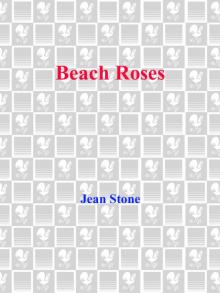 Beach Roses
Beach Roses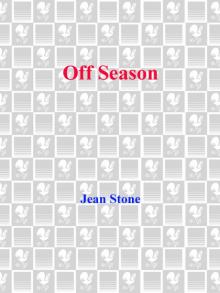 Off Season
Off Season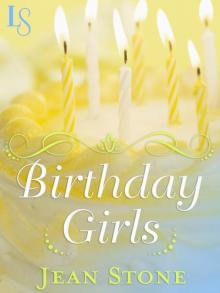 Birthday Girls
Birthday Girls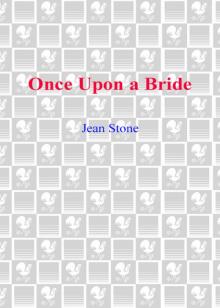 Once Upon a Bride
Once Upon a Bride Places by the Sea
Places by the Sea Trust Fund Babies
Trust Fund Babies The Summer House
The Summer House Tides of the Heart
Tides of the Heart Sins of Innocence
Sins of Innocence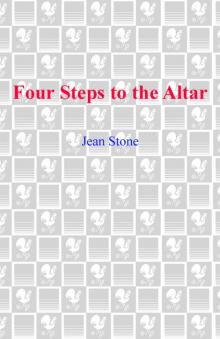 Four Steps to the Altar
Four Steps to the Altar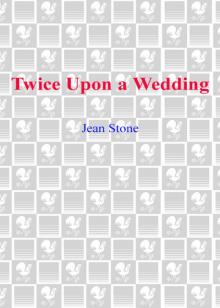 Twice Upon a Wedding
Twice Upon a Wedding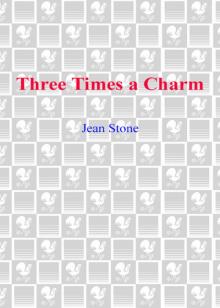 Three Times a Charm
Three Times a Charm